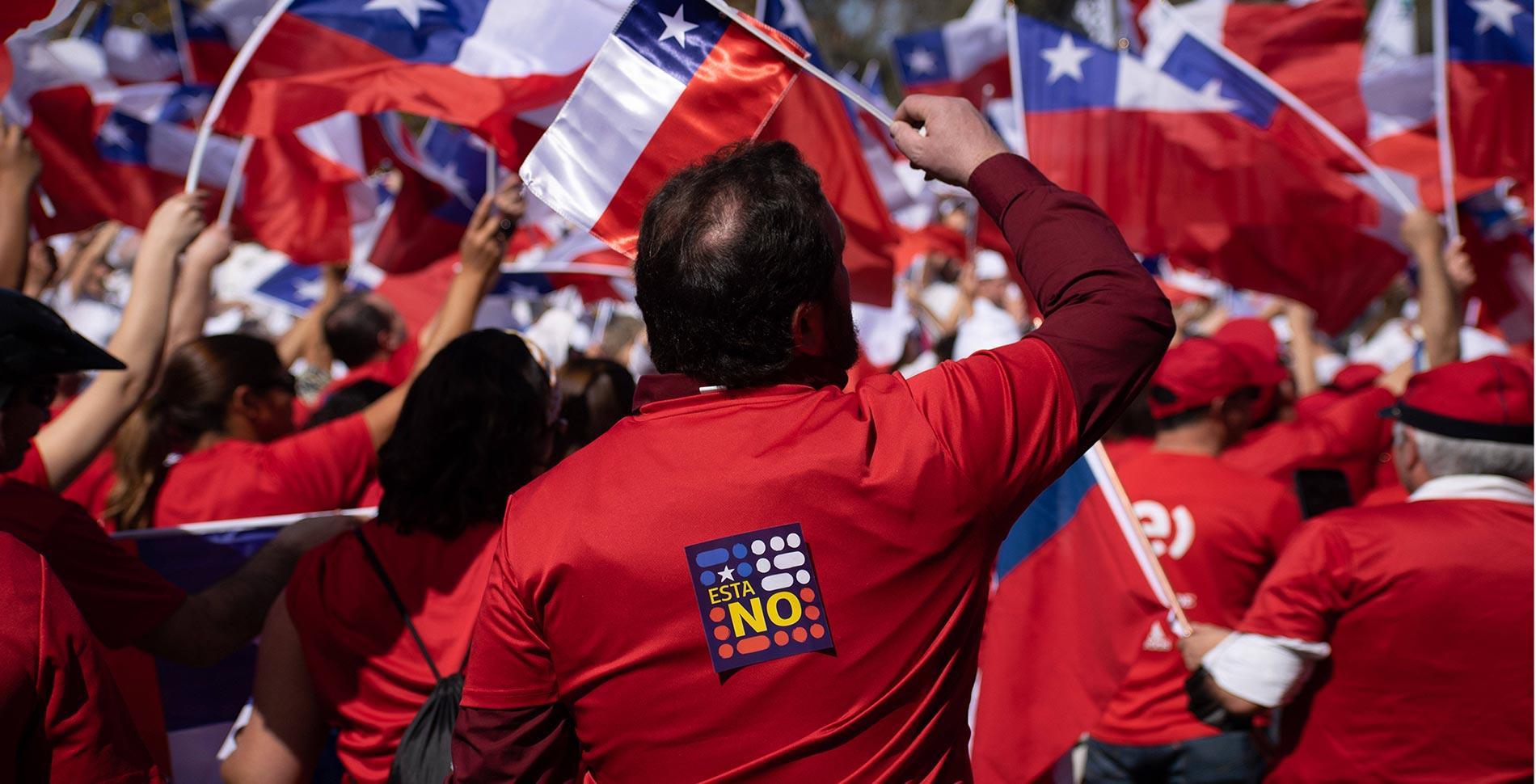The Chilean referendum in September 2022 on a new constitution was a disaster for President Gabriel Boric and the nascent left-wing movement that sought to bring an end to the Pinochet constitution. While the original referendum on whether the constitution should be replaced won a resounding 78% approval, the contents of the constitution, written by an elected Constitutional Convention, was rejected by an overwhelming 62% of voters. The left-wing coalition is in a crisis.
Rael Almonte Reyes, 15 November 2022
German version | Spanish version
The referendum on replacing the constitution is the culmination of a 30-year project which began when the Pinochet-era constitution was adopted in 1990. The constitution calcified the economic policies of the Pinochet regime, leaving the country with a semi-permanent neoliberal economic regime. The 1990 constitution enabled a small segment of the population to mass wealth while hindering any effort of redistribution. Today Chile is one of the most unequal countries in the OECD, with an income gap of 65% and around 1% of the population earning 33% of the country’s wealth according to a 2017 UN report.
Tensions due to inequality, coupled with a general dip in quality of living, exploded in 2019, when the right-wing President Sebastian Piñera announced a plan to raise the price of public transportation. While the government flinched shortly after the protests began, scrapping the proposed metro hike and shuffling the cabinet, the heavy-handed reaction to the demonstrations together with the declared state of emergency, enflamed tensions and shifted attention towards constitutional change. By the end of November 2019, the National Congress signed an agreement calling for a national referendum on whether to rewrite the constitution, and thus, a three-year political revolution was born.
The date of the referendum was set for October 2020, and from the moment the agreement was passed, three coalitions began to form. The right-wing formed Chile Vamos, an alliance of right-wing forces aiming to block any change from the Pinochet Constitution. The center-left, along with some center-right allies, formed Lista Apruebo with an aim to keep change to the constitution less radical and marginal. On the left, a very broad coalition known as Apruebo Dignidad took shape, which consisted of old and new left forces in Chile along with a loose coalition of left-wing anti-establishment independent candidates who would eventually form Lista del Pueblo, both aiming at radically changing the constitution. The results of the referendum were clear: 78% of Chileans approved drafting a new constitution and 79% asking for an independent Constitutional Convention. Seemingly, Chile voted to end to the Pinochet era.
Elections to elect 155 delegates to the Constitutional Convention were set for May 2020. The results were a clear mandate for changing the constitution. Apruebo Dignidad & Lista del Pueblo, along with Lista Apruebo and a list of “Non-Neutral Independents” who were pro-change, gained about 60% of the vote. It seemed all was on track to rewrite Chile’s constitution. Apruebo Dignidad, as the coalition with the most delegates in the pro-change wing, immediately began the process of writing a progressive constitution.
The constitutional change became a central issue in the 2021 presidential election. The left-wing rallied around a key-figure in the 2019 protest movement and the fierce advocate of constitutional change, Gabriel Boric who won 55% of the vote.
Using the election of Gabriel Boric to the presidency and a majority for change in the Constitutional Convention, Apruebo Dignidad and its allies in the Convention drafted a resoundingly progressive constitution. The constitution included universal rights to healthcare, housing and education; labor rights including right to organize, bargain and strike; a right to water, effectively turning the currently private potable water system into a public good; and defined Chile as a pluri-national state, similar to neighboring Bolivia, effectively granting regional autonomy to indigenous groups. Controversially, within the left-wing coalition, the delegates refused to add language nationalizing the copper industry, one of the main exports and source of wealth for the country.
Unsurprisingly, the new constitution faced vicious criticism from the right-wing. A well-monied media campaign dumped millions of dollars into everything from general attacks stoking racial tensions against indigenous peoples and Venezuelan migrants to personal smears against leaders of the “approve” campaign. On top of this expected opposition to the new constitution, the center-left, led by the Socialist Party, ironically the “heirs” of Salvador Allende, led an ambiguous campaign, with very little substance to their critiques, against the constitution. Nevertheless, momentum seemed to be on the side of approving the constitution. Instead, the progressive constitution was decidedly rejected, with “reject” winning an overwhelming 61% of the vote.
In the immediate aftermath of the referendum, Boric reshuffled his cabinet. The shuffle seems to indicate a likelihood that the center-left, led by the Socialist Party, will play a more significant role in drafting the second constitution that will go up for a vote. Six new ministers were announced, most notably Carolina Toha as the new Interior Minister and Ana Lya Uriarte as the new Secretary General of the Presidency, both of whom were high level ministers under the government of Michelle Bachelet, the last Socialist Party President. The Communist Party of Chile, a prominent member of the Apruebo Dignidad coalition, continues to hold key ministries, signaling that a new constitution is likely to result from a difficult negotiation process between the center-left and traditional left.
Whether this new constitution will be enough to placate the Chilean voters remains to be seen. The flexibility of President Boric and the willingness of the center-left to join the government signals that it is likely that a new constitution will be drafted. Whether the constitution is truly progressive in the end or only marginally different from the Pinochet constitution remains to be seen. Whatever the outcome, the right will be hostile to change. But with this recent boost, the right currently has gained leverage and support. Those in support of Boric insist that the political revolution will survive this major setback, but the landslide rejection of the new constitution has left his left-wing coalition government floundering for answers.
Picture: 28 August 2022, Santiago, Metropolitana, Chile: People against the new constitution gather in Santiago, Chile. On 4 September, Chile will voted to reject the new constitution with an overwhelming majority. © IMAGO / ZUMA Wire
Other Articles Which Might Interest You
Chile’s Political Turning Point: Gabriel Boric Elected President







